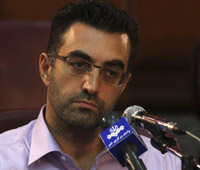Maziar Bahari’s chilling account of his 118 days in an Iranian prison is the cover story of Newsweek this week. Bahari, a renowned journalist and documentary filmmaker, was arrested soon after the disputed June 12 elections. While in prison, he was subjected to psychological and physical abuse. His captors wanted to convince him that he was alone, that the world had forgotten about him. When Bahari, left, discerned that there was in an international campaign to win his release his spirits were bolstered.
Toward the end of his account, Bahari writes the following:
“I doubt [my interrogator] ever cared about the multilayered pressure campaign that Newsweek and others had put together on my behalf—the editorials and petitions, the diplomatic démarches, the quiet personal efforts of world leaders. But there were Iranian officials who also disagreed with my detention. Soon after the election they might have been too hesitant or too powerless to do much. But by September, with Iran on the verge of nuclear talks, they could make the case that I had become a distraction.”
Over the next few weeks, we will be highlighting the plight of our jailed Iranian colleagues. Watch this space for information on how you help.
